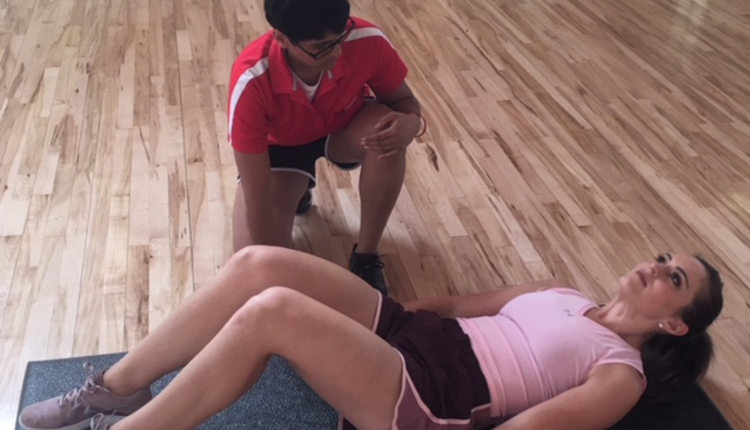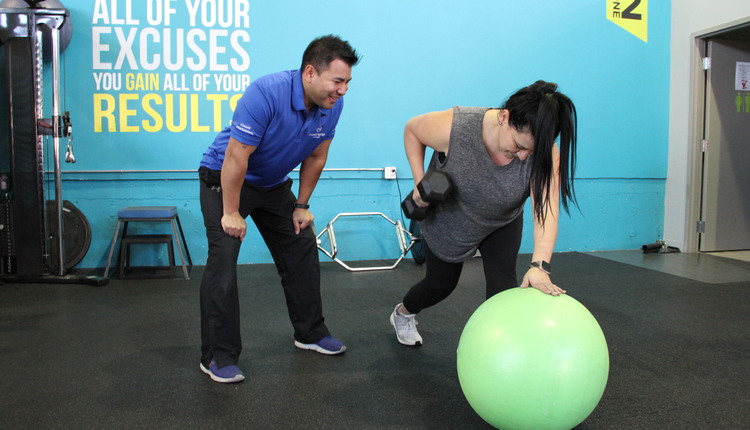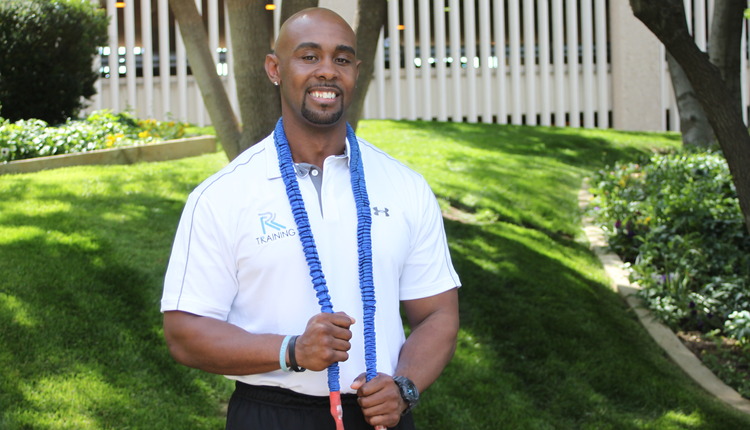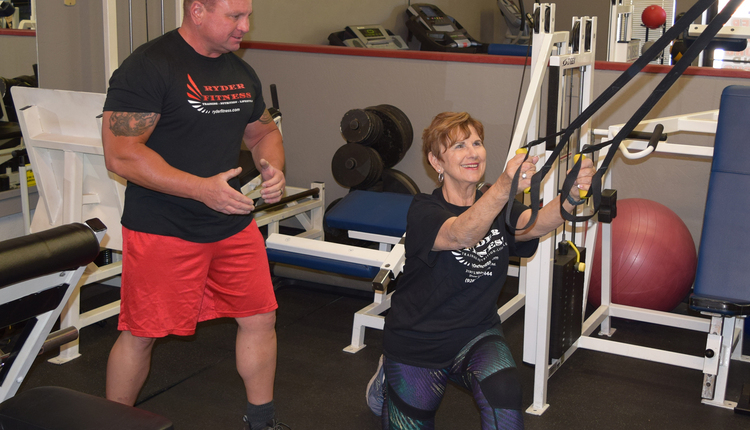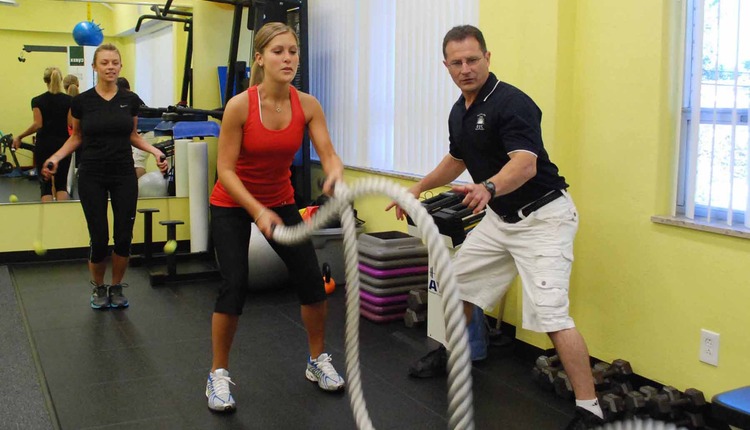Imagine being a retired Master Sergeant and SWAT Team Commander from the United States Air Force and entering the fitness industry during the early 1990s, just when the industry was poised for friendly takeover by military style boot camps. You’d definitely feel like you were in the right place at the right time and nothing could stop you, right? Unfortunately, then-42- year-old Ron Holland didn’t have the benefit of hindsight and, instead, with both optimism and uncertainty, looked for where he belonged during the second half of an already notable life.
An Officer and a Fitness Man
In 1978, Holland was selected as one of the first Air Force SWAT members. As an honor graduate, he went on to become an Air Force SWAT Team Commander and Instructor, leading and training teams all over the world. In 1983, Holland was deployed to the Philippines, where he was a non-commissioned Officer in Charge (NCOIC) for one of the largest security forces in the world. He was also the NCOIC of the “Fat Boy” program, where he worked with hundreds of overweight airmen and NCOs that would be discharged if they didn’t meet physical fitness standards.
Upon retirement, Holland joined the police department at the University of Arizona. He was used to leaving his fitness fingerprint in every area he worked, and law enforcement would be no different. While on campus, he started one of the first bicycle patrol units in the nation, training fellow officers to ride their bicycles for 10 hours a day and still have the energy to address any life-or-death situation.
The department soon chose him to be an instructor and sent him to The Cooper Institute of Aerobic Research for certification. While there, Holland was compelled to find how he could use this new certification beyond his duties in law enforcement.
Call of Duty
Back in Arizona, his former police sergeant, retired and an administrator in the University Medical Center, contacted him about some nurses who needed to lose weight. Holland agreed, and with no idea what to charge for personal training, decided to ask $17 per hour.
His first client dropped 12 pounds in two weeks. Other nurses took notice, and soon Holland was training four or five nurses a day, six or seven days a week, either outdoors, at the university rec center or wherever they could find space. He soon bumped his per-hour rate to $27, well above what other area trainers were asking, but Holland had proved at that point that he was worth every penny. Before long, Holland was making more money personal training than he was in his full-time job and felt rewarded by making such a difference in his clients’ lives.
In 1993, Holland decided to pursue fitness full-time. Having made fitness training an integral part of his past two careers, it seemed the obvious next step to follow his calling. Holland resigned from the police department and was hired as a manager in a big-box gym in Tucson. But his calling was in training clients, not managing a gym -- so, in 30 days, he started his own personal training business within that gym and, as the only trainer there, sold 10 training packages his first day.
As the training hours in his schedule surged, Holland hired other trainers as assistants. However, those trainers didn’t train in the same manner as Holland, and his clients weren’t getting the same experience or results. Holland’s wife, Jana, a juvenile probation officer, suggested that he use his military background to conduct group training sessions, which they jokingly referred to as “boot camp.”
Ten Hut!
In 1996, when the idea of a fitness boot camp was still years away, Holland launched his, not knowing if the idea would be a hit or if it would scare folks away. His first group of 20 was trained military style… outdoors. They ran in formation, carrying body bars (simulating rifles) and singing military cadence through the desolate 5:00 AM streets. When they arrived at the park, they low-crawled, high-crawled, crab-walked, did team rope pulls -- just like a true military boot camp.
Holland says word began to spread. “There’s this crazy ex-military guy running a program he calls ‘boot camp,’” they would say. He received local and national press, and similar programs began sprouting up across the country.
Holland changed his business name from Fit-Tek by Ron Holland to SWAT Fitness. The gym he was at began to recognize the power of the boot camp model and began emulating it. Holland knew it was time to move on.
Shot in the Dark
With no business, marketing or accounting experience (he now recommends to learn the business first!), Holland and his wife moved their business into a 700-square-foot space in an industrial park. By late 2001, they were running five group sessions a day, had initiated a marathon training program and hired a young, aspiring trainer to help out. He and Jana would open the studio at 5:00 AM; she would leave to work her full time job and then return, where both would remain until 7:00 or 8:00 PM. “They were long, hard days, and there was a steep learning curve,” says Holland. “Because there wasn’t anything to copy, we built our business on our instincts, intuition and hard work, taking a lot of risks along the way.”
Success, as it always does, followed their hard work. They soon doubled their space and, within a year, rented a second location across town. By 2004, they moved into their first “real” studio, says Holland -- a 1,600-square-foot space in a brand-new medical facility.
Even though their military-style boot camp model was doing well, Holland recognized that more fitness-oriented boot camps were taking over. He bought into the Adventure Boot Camp model in an effort to breathe new life into the program. He says that system gave him lots of new ideas as well as other trainers to learn from.
With two locations, a thriving indoor training business, boot camps and personal training, Holland discovered kettlebells in 2008. He instinctively knew, maybe because they originated in the military, that kettlebells would be a core part of their business. The only ones in the area to offer kettlebell training, SWAT Fitness soon offered a program they called “Kombat Kettlebells.”
At the same time, Holland began researching CrossFit and liked how it reminded him of the military. He and Jana became CrossFit-certified and opened their third facility, SWAT Fitness South, becoming the first Crossfit affiliate in Tucson.
Today, with three studios and 20 trainers, Holland has the luxury of slowing down… just a bit. He no longer does the early morning boot camps, but he still trains three clients, who have been with him 15 years.
Holland believes the military-style boot camp will soon make a resurgence, and he will begin offering his SWAT Boot Camp again within the year. Also, he believes kettlebell workouts will continue to grow in popularity.
But in the end, Holland just wants to be remembered as the one who made a difference. “I just want to be the guy that got results.”
Read more about Ron in the digital version>>
An Officer and a Fitness Man
In 1978, Holland was selected as one of the first Air Force SWAT members. As an honor graduate, he went on to become an Air Force SWAT Team Commander and Instructor, leading and training teams all over the world. In 1983, Holland was deployed to the Philippines, where he was a non-commissioned Officer in Charge (NCOIC) for one of the largest security forces in the world. He was also the NCOIC of the “Fat Boy” program, where he worked with hundreds of overweight airmen and NCOs that would be discharged if they didn’t meet physical fitness standards.
Upon retirement, Holland joined the police department at the University of Arizona. He was used to leaving his fitness fingerprint in every area he worked, and law enforcement would be no different. While on campus, he started one of the first bicycle patrol units in the nation, training fellow officers to ride their bicycles for 10 hours a day and still have the energy to address any life-or-death situation.
The department soon chose him to be an instructor and sent him to The Cooper Institute of Aerobic Research for certification. While there, Holland was compelled to find how he could use this new certification beyond his duties in law enforcement.
Call of Duty
Back in Arizona, his former police sergeant, retired and an administrator in the University Medical Center, contacted him about some nurses who needed to lose weight. Holland agreed, and with no idea what to charge for personal training, decided to ask $17 per hour.
His first client dropped 12 pounds in two weeks. Other nurses took notice, and soon Holland was training four or five nurses a day, six or seven days a week, either outdoors, at the university rec center or wherever they could find space. He soon bumped his per-hour rate to $27, well above what other area trainers were asking, but Holland had proved at that point that he was worth every penny. Before long, Holland was making more money personal training than he was in his full-time job and felt rewarded by making such a difference in his clients’ lives.
In 1993, Holland decided to pursue fitness full-time. Having made fitness training an integral part of his past two careers, it seemed the obvious next step to follow his calling. Holland resigned from the police department and was hired as a manager in a big-box gym in Tucson. But his calling was in training clients, not managing a gym -- so, in 30 days, he started his own personal training business within that gym and, as the only trainer there, sold 10 training packages his first day.
As the training hours in his schedule surged, Holland hired other trainers as assistants. However, those trainers didn’t train in the same manner as Holland, and his clients weren’t getting the same experience or results. Holland’s wife, Jana, a juvenile probation officer, suggested that he use his military background to conduct group training sessions, which they jokingly referred to as “boot camp.”
Ten Hut!
In 1996, when the idea of a fitness boot camp was still years away, Holland launched his, not knowing if the idea would be a hit or if it would scare folks away. His first group of 20 was trained military style… outdoors. They ran in formation, carrying body bars (simulating rifles) and singing military cadence through the desolate 5:00 AM streets. When they arrived at the park, they low-crawled, high-crawled, crab-walked, did team rope pulls -- just like a true military boot camp.
Holland says word began to spread. “There’s this crazy ex-military guy running a program he calls ‘boot camp,’” they would say. He received local and national press, and similar programs began sprouting up across the country.
Holland changed his business name from Fit-Tek by Ron Holland to SWAT Fitness. The gym he was at began to recognize the power of the boot camp model and began emulating it. Holland knew it was time to move on.
Shot in the Dark
With no business, marketing or accounting experience (he now recommends to learn the business first!), Holland and his wife moved their business into a 700-square-foot space in an industrial park. By late 2001, they were running five group sessions a day, had initiated a marathon training program and hired a young, aspiring trainer to help out. He and Jana would open the studio at 5:00 AM; she would leave to work her full time job and then return, where both would remain until 7:00 or 8:00 PM. “They were long, hard days, and there was a steep learning curve,” says Holland. “Because there wasn’t anything to copy, we built our business on our instincts, intuition and hard work, taking a lot of risks along the way.”
Success, as it always does, followed their hard work. They soon doubled their space and, within a year, rented a second location across town. By 2004, they moved into their first “real” studio, says Holland -- a 1,600-square-foot space in a brand-new medical facility.
Even though their military-style boot camp model was doing well, Holland recognized that more fitness-oriented boot camps were taking over. He bought into the Adventure Boot Camp model in an effort to breathe new life into the program. He says that system gave him lots of new ideas as well as other trainers to learn from.
With two locations, a thriving indoor training business, boot camps and personal training, Holland discovered kettlebells in 2008. He instinctively knew, maybe because they originated in the military, that kettlebells would be a core part of their business. The only ones in the area to offer kettlebell training, SWAT Fitness soon offered a program they called “Kombat Kettlebells.”
At the same time, Holland began researching CrossFit and liked how it reminded him of the military. He and Jana became CrossFit-certified and opened their third facility, SWAT Fitness South, becoming the first Crossfit affiliate in Tucson.
Today, with three studios and 20 trainers, Holland has the luxury of slowing down… just a bit. He no longer does the early morning boot camps, but he still trains three clients, who have been with him 15 years.
Holland believes the military-style boot camp will soon make a resurgence, and he will begin offering his SWAT Boot Camp again within the year. Also, he believes kettlebell workouts will continue to grow in popularity.
But in the end, Holland just wants to be remembered as the one who made a difference. “I just want to be the guy that got results.”
Read more about Ron in the digital version>>





